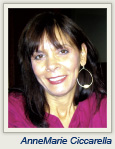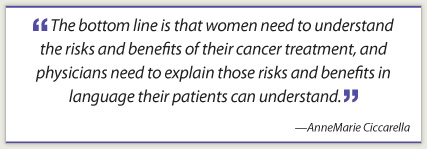The best advice I received after getting a diagnosis of stage I invasive lobular carcinoma in my left breast was from my radiologist, who told me, “Remember, be your own best advocate.” Those words have stayed with me through my 6-year struggle with breast cancer and its aftermath.
Extraordinary Steps
 I was 49 when I got my diagnosis and was immediately confronted with a difficult decision. Because my mother had been diagnosed with breast cancer 20 years earlier, when she was 49, I thought before I make any treatment decisions I should get a BRCA gene test. But even before I got the results, when I learned that with my type of breast cancer there was a chance the disease might already be in my other breast, I opted for a contralateral prophylactic mastectomy plus eight rounds of the chemotherapy regimen CMF (cyclophosphamide, methotrexate, and fluorouracil).
I was 49 when I got my diagnosis and was immediately confronted with a difficult decision. Because my mother had been diagnosed with breast cancer 20 years earlier, when she was 49, I thought before I make any treatment decisions I should get a BRCA gene test. But even before I got the results, when I learned that with my type of breast cancer there was a chance the disease might already be in my other breast, I opted for a contralateral prophylactic mastectomy plus eight rounds of the chemotherapy regimen CMF (cyclophosphamide, methotrexate, and fluorouracil).
My decision may seem extreme, given that the cancer had been found early and hadn’t spread to my lymph nodes. But when a pathology report of my right breast showed several areas of cellular atypia, I knew I had made the right choice. Still, coping with all these issues beforehand wasn’t easy. The word “mutilation” kept coming into my head, and I wished desperately that someone—my oncologist or someone else on my medical team—would just tell me what to do. Of course, only I could decide what was right for me. Only I could be my own best advocate.
The next medical decision was taken out of my hands. When my genetic test results showed mutations of unknown significance on both my BRCA1 and BRCA2 genes, the genetic doctor strongly suggested that I should have a prophylactic oophorectomy to prevent the possibility of my developing ovarian cancer. Since I was on letrozole anyway, there was no logical reason for me to keep my ovaries, and I had the surgery. My main goal for the course of action I followed was to reduce my risk factors for cancer recurrence as much as possible, even if it meant taking extraordinary steps like removing body parts.
In August 2007, just 2 months after I had finished my surgeries and chemotherapy, my mother was diagnosed with a second primary cancer in her other breast. In 2010, my 42-year-old sister was diagnosed with breast cancer. Now, I’m worried about what might lie ahead for my 26-year-old daughter, Stephanie, even as I’m hopeful that medical advances will derail any possibility that this will be her genetic fate.
Taking Advocacy to the Next Level
 To learn more about our family’s specific risk factors for breast cancer and to keep up-to-date on new research and treatments being developed to fight this disease, I’ve joined the Susan Love/Avon Army of Women. I work with breast cancer organizations throughout my state to encourage all women to join the Army of Women, whose goal is to find ways to prevent breast cancer.
To learn more about our family’s specific risk factors for breast cancer and to keep up-to-date on new research and treatments being developed to fight this disease, I’ve joined the Susan Love/Avon Army of Women. I work with breast cancer organizations throughout my state to encourage all women to join the Army of Women, whose goal is to find ways to prevent breast cancer.
I’ve also become active in educating women about one of the least recognized and talked about side effects of chemotherapy—chemobrain, a cognitive condition I only learned about recently, even though I’ve felt its effects for years.
An an accountant by profession, soon after undergoing chemotherapy I began noticing that I had difficulty performing even the simplest calculations, and recalling common words was often beyond my grasp. Over the years, I’ve even lost my ability to multitask and have had to learn to concentrate on doing one thing at a time to prevent becoming mentally overloaded and frustrated.
Had I known developing chemobrain was a possibility, I would have insisted on a neuropsychological evaluation before starting my treatment so I could compare the difference in my cognition before and after therapy. To help other cancer survivors learn about this devastating side effect and give them a place to talk about their experiences coping with the problem, I’ve launched a chemobrain blog (http://chemo-brain.blogspot.com/p/who-is-am.html).
The bottom line is that women need to understand the risks and benefits of their cancer treatment, and physicians need to explain those risks and benefits in language their patients can understand.
And most of all, a woman with cancer needs to be her own best advocate. ■
AnneMarie Ciccarella lives in Glen Head, New York.

